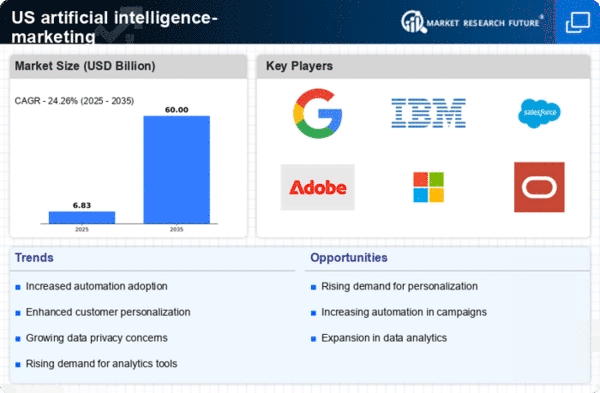Growing Demand for Automation
The growing demand for automation in marketing processes is a crucial driver for the artificial intelligence-marketing market. Businesses are increasingly seeking to streamline operations and enhance efficiency through automated solutions. It is estimated that automation can reduce marketing costs by up to 30%, making it an attractive option for organizations. AI technologies enable the automation of repetitive tasks, such as data entry and customer segmentation, allowing marketers to focus on strategic initiatives. This shift towards automation is likely to continue, as companies recognize the potential for improved productivity and reduced operational costs. As a result, the artificial intelligence-marketing market is expected to expand significantly in response to this demand.
Integration of Advanced Analytics
The integration of advanced analytics into the artificial intelligence-marketing market is a pivotal driver. Companies are increasingly leveraging AI to analyze vast datasets, enabling them to derive actionable insights. This trend is reflected in the projected growth of the analytics market, which is expected to reach $200 billion by 2025. The ability to process and interpret data at unprecedented speeds allows marketers to tailor their strategies effectively. As organizations recognize the value of data-driven insights, the demand for AI-driven analytics tools is likely to surge. This shift not only enhances marketing efficiency but also fosters a more personalized customer experience, thereby driving growth in the artificial intelligence-marketing market.
Regulatory Compliance and Data Privacy
Regulatory compliance and data privacy concerns are emerging as significant drivers in the artificial intelligence-marketing market. As data protection regulations become more stringent, companies are compelled to adopt AI solutions that ensure compliance while maintaining effective marketing strategies. The implementation of AI can facilitate better data management practices, helping organizations navigate complex regulatory landscapes. In 2025, it is projected that compliance-related expenditures will account for a substantial portion of marketing budgets. This necessity for compliance is likely to drive the adoption of AI technologies that prioritize data security and ethical practices, thereby influencing the trajectory of the artificial intelligence-marketing market.
Enhanced Customer Engagement Strategies
Enhanced customer engagement strategies are driving growth in the artificial intelligence-marketing market. Companies are increasingly utilizing AI to create more interactive and personalized experiences for consumers. By analyzing customer data, businesses can tailor their marketing efforts to meet individual preferences, leading to higher engagement rates. Research indicates that personalized marketing can increase conversion rates by up to 20%. As organizations prioritize customer satisfaction, the integration of AI into engagement strategies is becoming essential. This focus on enhancing customer interactions not only fosters brand loyalty but also contributes to the overall expansion of the artificial intelligence-marketing market.
Increased Investment in AI Technologies
Investment in AI technologies is a significant driver of the artificial intelligence-marketing market. As businesses strive to remain competitive, they are allocating substantial budgets towards AI solutions. In 2025, it is anticipated that spending on AI technologies will surpass $100 billion in the US alone. This influx of capital is facilitating the development of innovative marketing tools that harness machine learning and predictive analytics. Consequently, companies are better equipped to understand consumer behavior and preferences, leading to more effective marketing campaigns. The ongoing investment in AI not only propels technological advancements but also solidifies the position of AI as a cornerstone of modern marketing strategies.

















Leave a Comment